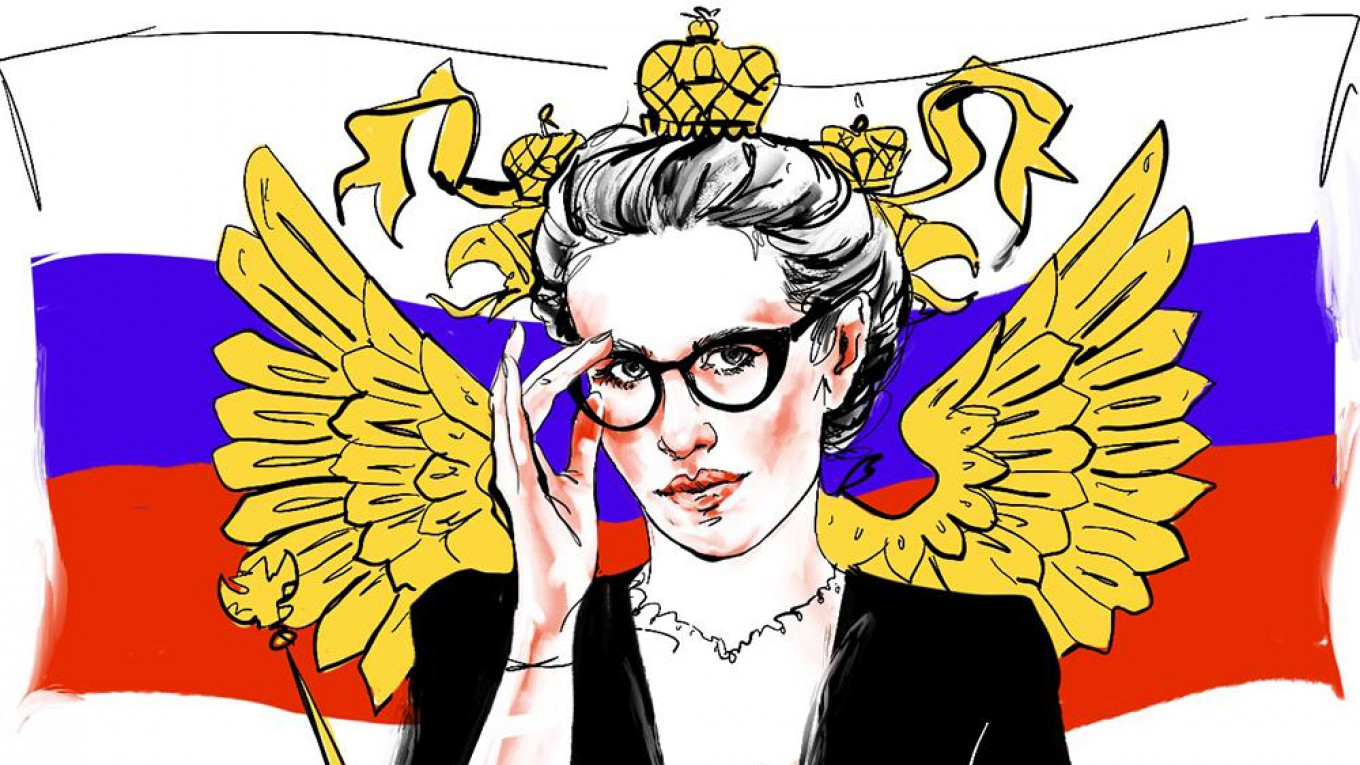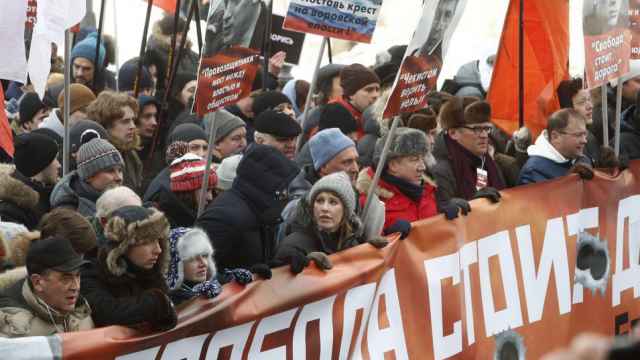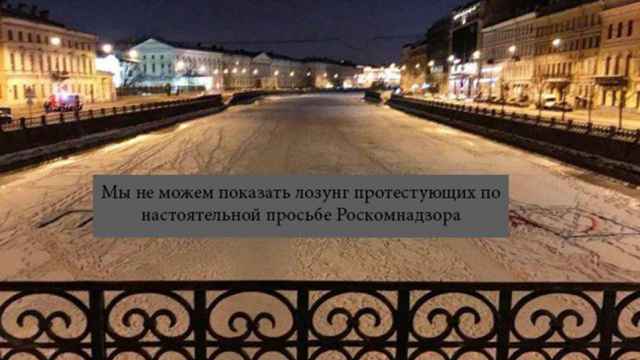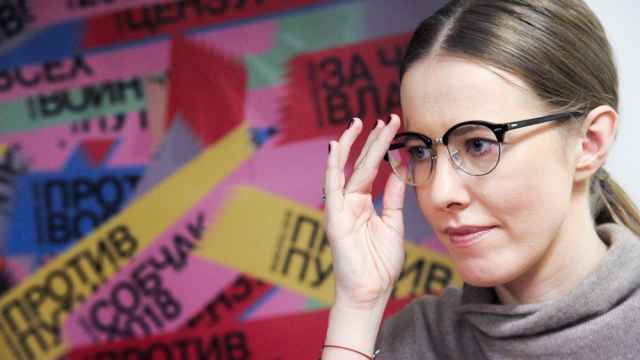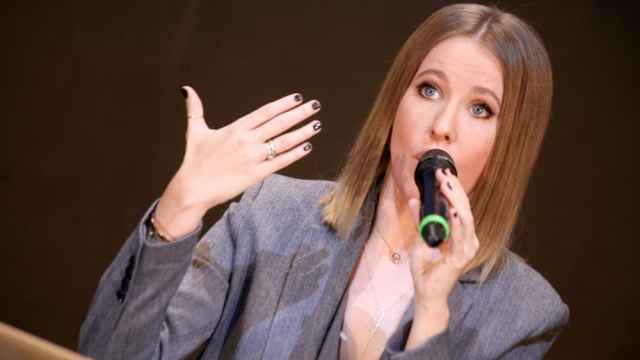The jeers and whistles rang out with venom. But that wasn’t going to stop Ksenia Sobchak: She was the one on stage, and she was the one holding the mic.
Standing in front of a crowd riled up by the previous three weeks of protests against President Vladimir Putin, the woman who needed no introduction — the country’s original “it” girl, known as Russia’s Paris Hilton — uttered the words that would usher in her political awakening.
“I am Ksenia Sobchak,” she said, “and I have something to lose."
Sobchak’s father, Anatoly, was the first democratically elected mayor of St. Petersburg and a mentor to Putin.
His daughter, on the other hand, had done little to indicate that she might one day become a prominent figure in Russian politics. She had been a star celebrity for years, her public persona elevated as the host of a scandalous reality TV show, a scantily clad magazine cover girl and a regular tabloid fixture.
In fact, Ksenia Sobchak wasn’t meant to be on stage that frigid December afternoon in 2011. Ilya Ponomaryov, a leader of the Snow Revolution — the protests sparked by allegations of election fraud — was with her. He remembers there was an online vote to select the speakers, and Sobchak's name was not among them.
“We were standing in a group with [Ilya] Yashin and [Boris] Nemtsov” — two key opposition leaders at the time — “and they swept us up onto the stage,” said Ponomaryov. “And once we were up there, we were there.”
The crowd did not take kindly to Sobchak. “It seemed like they were just going to climb up there and tear her apart,” says Ponomaryov. Yet for nearly five minutes, she spoke, resolutely, over the taunts.
As the political protests petered out over the next few years, so too did Sobchak’s political voice. She became the host of a popular weekly news show on the opposition-leaning television channel Dozhd. On major issues like the decriminalization of domestic violence, or the demolition of Soviet-era apartment buildings, she remained silent.
Then, on Wednesday last week, following weeks of speculation, Sobchak announced that she would be running in presidential elections next March — yet another in a catalogue of transformations she has made that have caught bystanders off-guard.
Anton Krasovsky, a prominent journalist and television personality who has known Sobchak since she was 18, says he too could not have anticipated her turn toward politics.
Recounting Sobchak’s Snow Revolution speech, Krasovsky said, “I found about it along with the rest of the country.”
Political beginnings
Sobchak, now 35, was born in Leningrad towards the end of the Cold War. After the fall of the Soviet Union in 1991, her father, a co-author of the Russian constitution and democratic reformer, became the first elected mayor of her home city.
The elder Sobchak also gave a young Vladimir Putin — whom he first taught as a law professor at Leningrad State University in the 1970s — a role in his administration, his first job out of the KGB.
Sobchak was an important mentor to Putin over the next decade, says Gleb Pavlovsky, a political scientist. “Because Putin was far from politics then and hadn’t yet formed his own political views, I would say that Sobchak even affected him ideologically,” Pavlovsky said.
A personal conversation with Putin during the summer of 1998 sticks out for Pavlovsky: At one point, Putin used a phrase that he recognized as Sobchak’s.
“Power can be influential in two ways,” Pavlovsky remembers Putin saying. “Citizens can either feel the government belongs to them or they can be frightened by it.”
Dmitry Oreshkin, a political scientist, says the connection between Putin and the Sobchak family is inextricable. “Sobchak was a father figure to him,” says Oreshkin. And Putin, he added, “helped Sobchak till the end.”
Sobchak was defeated in his 1996 re-election bid and fled to Paris amid corruption charges, reportedly helped in his escape by Putin. He only returned in 1999, after his protege had become Russia’s prime minister. When Sobchak died the next year, Putin wept at his funeral.
In 2012, Sobchak’s longtime aide Vatanyar Yagya, put it plainly: “Putin saved the life of Sobchak.” At her first press conference since announcing her candidacy, Ksenia Sobchak echoed his words: "Of course for some Putin is a tyrant and dictator. Others consider him Russia's savior. But I’m in a difficult position,” she said. “Putin helped my father — and practically saved his life.”
To be a celebrity
After her father’s death, Ksenia and her mother, Lyudmila Narusova, who would soon become a high-ranking government official, moved to Moscow. “Putin took Sobchak’s family under his wing,” says Oreshkin. “He gave Sobchak’s widow government status and protection.”
Ksenia enrolled in Moscow’s prestigious State Institute of International Relations, but she was already seeking out the spotlight: Her work on the popular reality TV show “Dom-2” (House-2) began while she was still in school, she has said.
Sobchak was hard at work in those years, remembers Krasovsky. “She would travel outside Moscow where filming took place twice a day, seven days a week, working 10-11 hour days,” he says. “It was never-ending.”
Sobchak certainly did begin to build an empire, and her own personal brand. “Dom-2,” in which contestants built a house and competed to partner off, was a litany of raunchy behavior. It was also hugely popular.
She hosted other shows, too, opened a restaurant, launched fragrances, developed an image as a fashionista, authored several books, including “Philosophy in the Boudoir” and “How to Marry a Millionaire,” and appeared nearly nude on the covers of Playboy and Maxim. According to Forbes Russia’s latest tally, Sobchak is worth $2.1 million.
But Sobchak was also enjoying life, throwing herself headlong into the hedonism and materialism brought into Russian society by the oil boom. It was a time when, as Krasovsky puts it, “The wealthy and happy Russia was just starting. No one was thinking about politics.”
A 2007 W magazine profile described Sobchak, then only 25, as “the new zeitgeist” — “an emblem for a way of being in today’s Russia — brash, sultry, self-involved.”
She entered into high profile engagements as quickly as she broke them off, and paparazzi captured her scandalous acts: cursing drunkenly, dancing lasciviously, kissing publicly. Through it all, she propelled herself into the highest reaches of the celebrity stratosphere.
“I was beautiful and stupid, and I loved my life,” Sobchak would later say. “I felt like a starving girl who was allowed into a candy shop, and I ate all the chocolates.”
‘I am not against Putin’
Sobchak might have first seen her political opening several months before speaking at the Snow Revolution protests.
Happening upon Vasily Yakemenko, then head of the Agency for Youth Affairs and the later founder of pro-Kremlin youth movement Nashi, at a lavish Moscow restaurant, Sobchak loudly told him it wasn’t surprising to find a celebrity drinking expensive champagne. But what, she asked, was a government official doing there?
Her video of the encounter went viral — and following her December speech, Sobchak had suddenly refashioned herself into a government critic.
Yet she was always careful not to say she was against her father’s former protege. “I’m against this system. I’m against bureaucratization, corruption, seeing the same people in power,” she told the liberal-leaning New Times outlet. “But I’m not personally against Putin.” During the Snow Revolution speech, she said, “I don’t want to change power, but influence power.” Still, Sobchak told The New Yorker that when she had gone to see Putin to explain her role in the protests, he would not speak with her.
Putin might have been signaling his displeasure with Sobchak’s rebranding when investigators showed up at her apartment on the morning of June 24, 2012, unannounced.
They rifled through it for nine hours, turning up a naked Ilya Yashin, the opposition leader, in her bed, and, in her safe, more than one million euros and nearly half a million dollars in cash. It was an unusually humiliating display for someone from Putin’s own circle. As Pavlovsky, the political analyst put it, “They would not have done it without Putin’s approval.”
After the raid, "Dom-2" was canceled and Sobchak has claimed she was barred from appearing on state TV. Nevertheless, she continued career-building at an abrupt clip. She rebranded herself yet again, this time as a political journalist with her show “Sobchak Live” on the liberal-leaning Dozhd TV channel. All the while, she stayed within in her role as a journalist. “I’m not a politician,” she said the day after the raid on her apartment. “At least not yet.”
If there ever was a rift between Sobchak and the Kremlin, however, Putin did not let on. His administration has continued to refer to her in familiar terms.
At the president’s annual end of year news conference in 2014, when he answers questions from an auditorium of journalists, Sobchak, trembling slightly, asked Putin whether he was worried about the state of the country. “Ksyusha,” Putin began, using a diminutive version of her first name.
And following the announcement that Sobchak would run against Putin in March 2018, his spokesman Dmitry Peskov repeatedly refers to her as Ksenia and, like Putin in 2014, Ksyusha.
‘Against all’
Nearly six years since she stepped out before the hostile crowd on Prospekt Sakharova in 2011, Sobchak has decided to run for president. Her slogan, “Against all,” brands her the candidate for Russians of all stripes looking to cast a protest vote.
“She is like a young and liberal Trump,” Demyan Kudryavtsev, the owner of the Russian business daily Vedomosti where Sobchak broke the news of her decision to run, told The Moscow Times.
In her letter published by Vedomosti, Sobchak presents herself as a pro-business, pro-rights candidate, proposing to reform courts and education; develop private business; and privatize large state corporations. She also criticizes gender and sexual discrimination.
“She has strong political opinions. But they’re not sharp, they’re not oppositional in the sense of Alexei Navalny,” says Kudryavtsev, who has known Sobchak since the early 2000s.
Navalny, a leading opposition figure, has been barred from running due to a prior conviction that he says is politically motivated. By comparison, the early stages of Sobchak’s campaign have been met with almost no Kremlin resistance.
As a candidate unaffiliated with any political party, she will have to collect 300,000 signatures in a matter of weeks just to place her name on the ballot, a task seen as insurmountable without the Kremlin’s support.
According to the New Times, Sobchak had hoped with her campaign to make a return to state TV — a box she checked last night on Andrei Malakhov’s show, broadcast on Russia’s most-watched network, Rossia-1. (Navalny is barred from appearing on state TV — and his name is carefully avoided by Kremlin officials.)
All this has bolstered the view that Sobchak is a Kremlin stooge: a tool for Putin to channel anger at the Kremlin into a non-threatening vote. Her critics draw parallels between now and 2012, when Mikhail Prokhorov ran for president. The billionaire came nowhere close to victory — finishing third with nearly 8 percent of the vote — but many believed that had never been the point.
The liberal opposition is split on whether to back her. Some have expressed their support, saying that any liberal candidate is a good candidate. Some say her campaign is a farce and that they won’t give it oxygen.
Still, a number of prominent liberal figures have signed on to work with her. They include economist Sergei Aleksashenko, former Boris Yeltsin electoral advisor Igor Malashenko, and Vitaly Shkliarov — who helped engineer the victory of 267 candidates affiliated with opposition politician Dmitry Gudkov in local elections several months ago.
Shkliarov, who made a name for himself campaigning in the United States for Barack Obama and Bernie Sanders, vehemently denies that Sobchak’s campaign is linked to the Kremlin. Even if the cards are stacked against any candidate opposing Putin, Shkliarov said, “This doesn’t mean that we can’t still try to win the elections.”
Irina Khakamada, who was the first woman to run for president, in 2004, says the opposition might be overly obsessed with whether Sobchak is playing the Kremlin’s game. “We are schizophrenic about ties to Kremlin,” she says, “but we truly don’t know.”
In any case, Khakamada believes Sobchak’s candidacy is a good thing. “Elections have long turned into a farce,” she said. “The more interesting they become, the better. After all, Ksenia will be talking about real issues.”
While Sobchak certainly has the pundits to convince, she may have to worry about the public more — she recently topped a poll of Russia's least trusted public figures. Still, she is among the most recognizable personas in Russia — one that can put on a show.
"You can laugh at me,” Sobchak said at this week’s press conference, “but I understand show business."
And, she added, “I know how to be loud.”
A Message from The Moscow Times:
Dear readers,
We are facing unprecedented challenges. Russia's Prosecutor General's Office has designated The Moscow Times as an "undesirable" organization, criminalizing our work and putting our staff at risk of prosecution. This follows our earlier unjust labeling as a "foreign agent."
These actions are direct attempts to silence independent journalism in Russia. The authorities claim our work "discredits the decisions of the Russian leadership." We see things differently: we strive to provide accurate, unbiased reporting on Russia.
We, the journalists of The Moscow Times, refuse to be silenced. But to continue our work, we need your help.
Your support, no matter how small, makes a world of difference. If you can, please support us monthly starting from just $2. It's quick to set up, and every contribution makes a significant impact.
By supporting The Moscow Times, you're defending open, independent journalism in the face of repression. Thank you for standing with us.
Remind me later.



